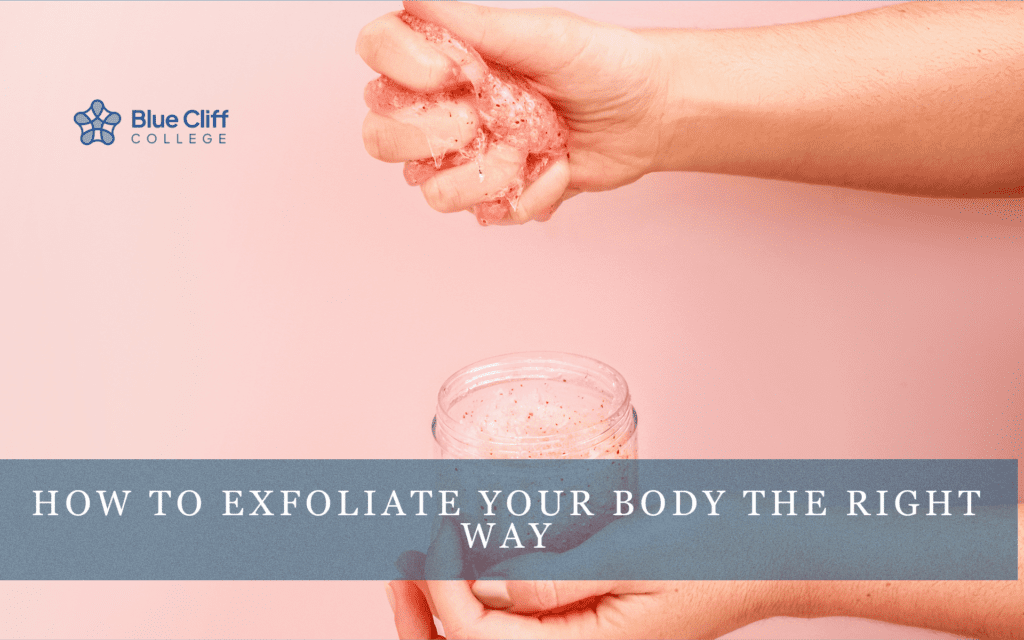Exfoliating both your body and your face is essential to having healthy, glowing skin. While exfoliating your face is more of a simple, common practice, body exfoliation can be a little more complex when you’re choosing the right method and products.
Let’s discuss what body exfoliation is, why it’s important, the different methods, how to exfoliate for your skin type, and how often you should exfoliate.
What is Body Exfoliation?
Body exfoliation promotes skin cell turnover by removing dead skin cells and uncovering fresher, smoother skin underneath. It also enhances blood circulation and prepares your skin for better absorption so that products that moisturizers can work more effectively.
The Importance of Body Exfoliation
Body exfoliation is essential because it gets rid of dead skin cells. As your body ages, the skin’s natural ability to shed dead surface cells slows down, and can even stop altogether. When dead skin cells aren’t shed, dry and ashy-looking skin can make your arms, legs, and elbows in particular look dull and uneven.
Body exfoliation is also designed to bring rest, relaxation, and balance to your body, mind, and soul. Not only does it assist in removing dead skin cells, but also aids healthy circulation.
How to Exfoliate Your Body
Physical Exfoliation
Physical exfoliators include scrubs, brushes, and other exfoliation tools. They work by physically removing dead skin cells through gentle rubbing motions. They’re a popular choice because they offer instant results and are easy to control.
However, it’s important to be careful with physical exfoliation. Some scrubs can be too abrasive and harm your skin. They also need to be used evenly across your skin or there’s the potential for uneven exfoliation.
DIY Scrub
Each DIY scrub is made up of two parts: a physical exfoliant and an emollient. Popular ingredients for scrubs include brown sugar, white sugar, coffee grounds, and salt. As for hydration, any beauty oils on the market will work, like olive oil, jojoba oil, almond oil, or grapeseed oil. If you’d like, you can also utilize essential oils, soothing botanical waters, or other natural hydrators.
Dry Brushing
Dry brushing is said to encourage circulation, assist with lymph drainage, and boost energy. However, its most common use is for a great exfoliation. Common bristle materials on dry brushes include nylon or natural boar bristle. They can also come in options including long, medium, curved, or no handle. None of these are more effective than the others; it’s just a matter of what you’re the most comfortable using.
Store Bought Scrubs
Store-bought scrubs are also a great option. There are a number of store-bought options that are natural and an excellent blend of hydrating and granular. However, it’s crucial to remember that these body scrubs cannot be used on your face. They are often thicker and contain higher concentrations of acids to exfoliate your body’s tougher skin.
Loofas or Sponges
Loofahs and sponges are popular because they help body cleansers lather as well as act as a gentle exfoliator.
Towels
Towels can also be used as a gentle exfoliator if you use coarser fabrics or a lot of physical pressure. An excellent choice for exfoliation is a muslin cloth, which can be brought into the shower with you and used to apply body cleanser. Alternatively, once you’re finished with a shower, you can use a dry cloth to buff away the dead skin cells. This can be done by drying the skin in small circular motions around your body.
Why Choose A Career In The Beauty Industry?
Chemical Exfoliation
Chemical exfoliators utilize alpha-hydroxy acids, beta-hydroxy acids, and enzymes to break down dead skin skills without the need for physical rubbing. This type of exfoliation can provide even exfoliation that goes deeper than physical exfoliation does.
Keep in mind that chemical exfoliation can cause irritation or allergic reactions for those with sensitive skin. They also require a little more time for the results to show than physical exfoliation does.
Alpha Hydroxy Acids
Alpha Hydroxy Acids not only aid in exfoliation but also helps to:
- Brighten the skin
- Boost collagen production
- Eliminate the appearance of fine lines
- Correct skin discoloration
- Promote blood flow to the skin
Beta Hydroxy Acids
Beta Hydroxy Acids penetrate deeply into your skin to remove dead skin cells and dissolve oil.
This can also:
- Assist with deterring acne breakouts
- Improve skin texture
Exfoliation By Skin Type
Determining how often to exfoliate your body is closely tied to your skin type and its response after exfoliation. It’s generally recommended to have a routine of two to three times per week for most skin types. Nevertheless, it’s crucial to customize the frequency to your unique skin needs and consider the potency of the exfoliating product you choose.
- Dry Skin
Try to use gentler chemical formulas like glycolic acid. - Sensitive Skin
Use gentle products designed for sensitive skin. Natural enzymes like papaya and pomegranate are great options. - Oily Skin
Most types of physical exfoliants or strong chemical exfoliants will work well for oily skin. - Normal Skin
Almost all types of products are safe to use. - Combination Skin
Choose more gentle methods for your dry skin areas and stronger scrubs for oilier areas.
How Often Should You Exfoliate?
- Dry Skin
If you have dry skin, only exfoliate once or twice a week. Make sure to stay away from harsh exfoliants that could lead to further dryness. - Sensitive Skin
Exfoliation should be dialed back to only once a week. If your skin is particularly sensitive, you may want to skip it completely. - Oily Skin
With oily skin, you can exfoliate a little more frequently. Even daily exfoliation can assist if your skin tolerates it well. - Normal Skin
Exfoliate two to three times a week as a safe starting point. You can exfoliate more frequently if your skin tolerates it well. - Combination Skin
For combination skin, you will want to exfoliate around three times a week if your skin tolerates it well.
Are You Ready to Start Your Career in the Beauty Industry?
Thriving in the beauty industry requires a genuine passion for creativity and helping others. If this resonates with you, explore the opportunities by enrolling in our affordable cosmetology or esthetics programs at Blue Cliff College. Our experienced professionals will not only provide you with in-depth knowledge but also offer invaluable hands-on training to help you earn your license.
Enroll now or contact us to learn more about these programs and others that are offered by Blue Cliff College.





